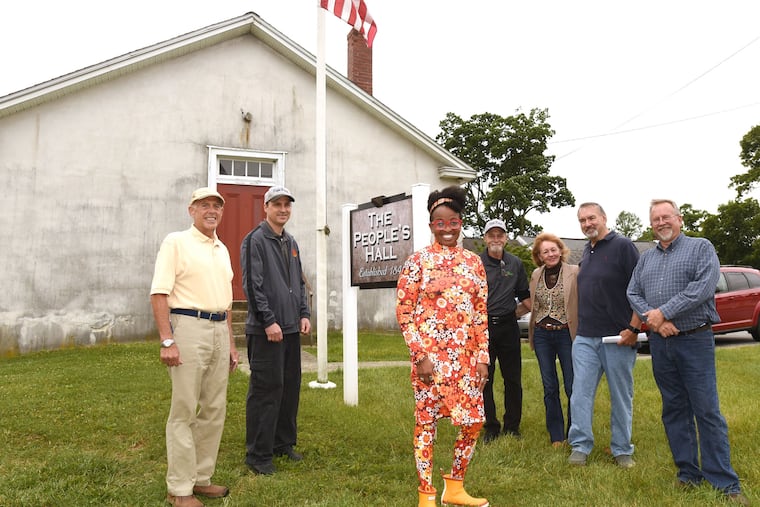People’s Hall, a 19th-century site in Chester County where abolitionists met, is in need of repairs
An event on Friday will raise funds for the East Fallowfield hall, which was built in 1845 so that abolitionists would have a place to speak freely about ending slavery in the United States.

Frederick Douglass, perhaps the most recognizable abolitionist in the United States, penned a letter to a Quaker Friend about his recent travels to Chester County to lecture against slavery in September of 1844
Douglass, who escaped slavery in Maryland and was living in Massachusetts, traveled to West Chester to speak. According to the letter which is part of the Frederick Douglass Papers, “the Courthouse and the churches of the village, being closed against us, our friends there had provided to hold the meeting in a beautiful grove, less than a mile distant from the village.”
But Douglass and other abolitionists who traveled to Quaker meetinghouses in Chester County didn’t always find welcome. In fact, after a brawl closed down the Fallowfield Meeting House, Quakers and other abolitionists pooled their money to build another building, People’s Hall, where abolitionist meetings could take place without disturbance.
That 178-year-old building is in need of repairs, and a fundraiser to pay for maintenance of the building will take place Friday evening.
Abolitionist speeches and a riot in a meetinghouse
Douglass went on to describe attending another antislavery meeting in Fallowfield where he traveled with “our friend James Taylor, in whom the hunted slave has often found a warm friend while groping his way in the dark from slavery to freedom.”
A few months later, in the “winter of 1844,” according to one source, or in “January of 1845,” according to another, a riot broke out at the Quaker meetinghouse at Ercildoun, a small hamlet that is part of East Fallowfield Township, a short distance south of Coatesville.
People had gathered to hear from another well-known Massachusetts, abolitionist, Abby Kelly Foster. But before she spoke, a Chester County doctor, Edwin Fussell, began speaking.
Joseph Pennock of Philadelphia wrote what happened next:
“Edwin Fussell had just commenced speaking … a mobocrat in the back part of the house cried out, ‘there you have talked enough.’ Then came the din of war. Whistling, shrieks, cries of ‘drag him out, clear the house ‘ resounded. ... The stove-pipe was knocked out; the women rushed from the house … some others leapt out of the windows. … Benjamin Jones stood up on a bench in the midst of the disturbers, and asserted to good purpose the right of every human being to utter his free thoughts upon any questions.”
A magistrate issued arrest warrants for eight of the rioters in January 1845. When a trial took place in February 1845, only one defendant could be found for it.
He was William Lukens, who was found not guilty by the jury.
The Quaker opposition to abolitionist meetings
Historians have cautioned that the fight over having lecturers speaking about enslavement — there was also opposition to temperance society meetings — does not mean that some Quakers were necessarily pro-slavery.
Christopher Densmore wrote that opposition from some Quakers was not about the subject matter, “but that a paid lecturer was going to deliver a prepared address. This, those Friends maintained, was speaking according to human wisdom rather than relying exclusively on the leadership of the Spirit.”
In other words, some of those Quakers who were against having antislavery gatherings in the meetinghouse may have been antislavery also. They just believed a religious meeting place should not be used for politics.
According to tonya thames taylor, an associate professor of history at West Chester University, the Fallowfield Meeting House was shut down for a few months after the brawl.
Taylor — who is a Quaker and a member of the Fallowfield Monthly Meeting — also said the Quakers in Chester County were mindful of the violence that led to the burning down of Pennsylvania Hall in Philadelphia in 1838, when mobs were upset that Black and white abolitionists, men and women, were meeting together.
And, she noted, this part of Chester County is only a few miles from the Mason-Dixon Line. She said there were possibly some Quakers who may have not been as upset about slavery because of their proximity to Maryland, where people were enslaved.
The People’s Hall, then and now
Because of the deep division about using the meetinghouse for political meetings addressing the “worldly” conditions of that day, Quakers and other abolitionists pooled their money to build another building, People’s Hall, where abolitionist meetings could take place without disturbance, she said.
The People’s Hall, which Black people as late as the 1970s recalled was also called Freedom Hall, has been in use as a meeting place continuously since 1845. Taylor said that not only did abolitionists meet there, but after emancipation, the building was a meeting place for farmers, the Boy Scouts, and others.
Today, however, the floors need refinishing, there are cracks in the walls around its stage, and repairs to the ceiling are already underway.
People’s Hall is owned by the people of Fallowfield Township and is managed by a board of trustees. Taylor said it is difficult to apply for grants because when donors ask who is the property owner, the accurate answer is “the people.”
The fundraiser, “Liberty and Freedom at People’s Hall,” will feature music, a history reenactor, and foodwill take place from 6 to 8 p.m. Friday, June 23, at People’s Hall, at 801, Doe Run Rd., East Fallowfield, Pa. 19320. For more information, go to the People’s Hall website. Or call 484-247-4279.